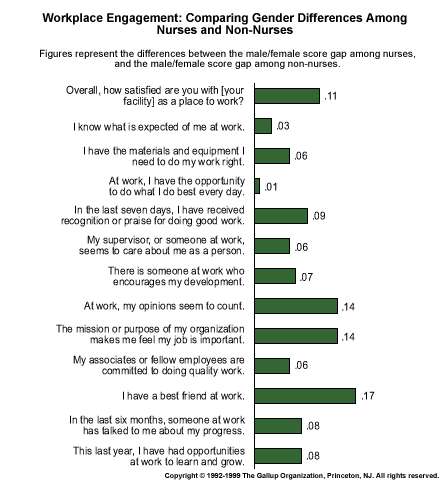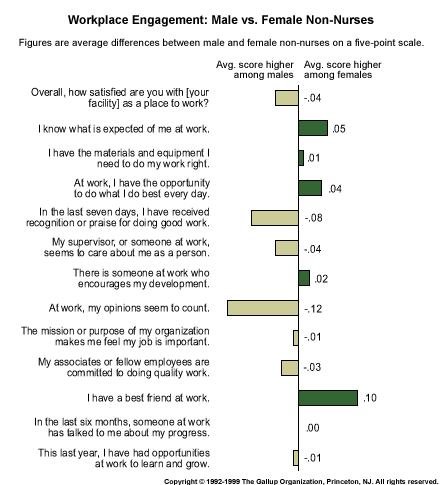This is the second article in a three-part series on gender effects in the nursing profession.
The first part of this series discussed the finding that female nurses are more likely to be satisfied with their employment than male nurses are. Among the question items on Gallup's employee engagement survey, those for which the results indicate key differentiations between male nurses and female nurses are "I have a best friend at work" and "The mission or purpose of my organization makes me feel my job is important."
The gender divide among nurses' responses, while interesting in and of itself, is more enlightening once we account for differences ordinarily found more generally across healthcare professions. In other words, how do these gender differences in the nursing profession compare to gender differences among other types of healthcare workers?
Are Gender Differences in Nursing Different From Those Among Other Healthcare Workers?
The answer is a resounding "yes." Using a five-point scale, female nurses score .07 points above male nurses in overall satisfaction. On the other hand, male non-nurse healthcare workers score .04 points above female non-nurse workers in overall satisfaction, a .11 difference in relationship. Further, while female nurses score above male nurses on all 12 attributes of engagement, male non-nurse healthcare workers score above females in the same roles on six of the 12 attributes.

Male non-nurses score most above female non-nurses on "At work, my opinions seem to count" and most below female non-nurses on "I have a best friend at work." Male non-nurses score above male nurses on overall satisfaction and all 12 individual employee engagement items. Female non-nurses also score above female nurses on overall satisfaction and on 11 of the 12 engagement items. The scores on the item "This last year, I have had opportunities at work to learn and grow" are identical for female nurses and female non-nurses.

What Factors Most Differentiate Between Male Nurses and Female Nurses?
When we factor out the effects of gender differences between male/female nursing from the effects of gender differences also found among non-nursing staff members, we get a better idea of which gender gaps are unique to the nursing profession. Three factors emerge as most discriminating male and female nurses.
- I have a best friend at work.
-
Having a "best friend at work" is the single greatest differentiator between men and women -- both among nurses and among non-nurse healthcare professionals. In both populations, females score higher than males do. However, the difference is so extreme in nursing that having a "best friend at work" continues to be the single greatest differentiator between males and females, even over and above the gender variation found for this item in the healthcare field in general.
- The mission or purpose of my organization makes me feel my job is important.
-
In the examination of nurses alone, this item continues to be the second most effective differentiator. Male nurses score significantly lower than female nurses; on the other hand, no difference is observed between male non-nurses and female non-nurses.
- At work, my opinions seem to count.
This is the item for which the picture changes the most when gender-based nursing responses are adjusted to account for general differences found in other healthcare professions. Among other healthcare professions, males score significantly higher than females on this question. However, among nurses no significant difference is observed between males and females, suggesting that their status as nurses is working against the general tendency of men to rate this item higher than women. Thus, in the context of more general healthcare scores, it can be seen that factors specific to nursing are having more effect on men's responses to this questions than the nursing data alone would suggest.
Key Points
Comparing the engagement scores among nurses and non-nurses does not alter the finding that the following two survey items effectively differentiate between the attitudes of male and female nurses: "I have a best friend at work" and: "The mission or purpose of my organization makes me feel my job is important." However, adjusting for gender-based differences among non-nursing employees does provide one additional key indicator: "At work, my opinions seem to count."
If the goal is to reduce turnover among male nurses and attract more males into the nursing profession, what are the implications of these findings? That question will be addressed next week in the conclusion of this series.
The Q12 items are protected by copyright of The Gallup Organization, Princeton, NJ, 1992-1999.